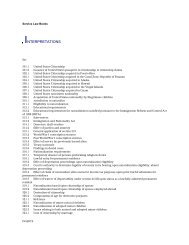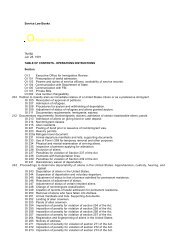You also want an ePaper? Increase the reach of your titles
YUMPU automatically turns print PDFs into web optimized ePapers that Google loves.
<strong>Inspector's</strong> <strong>Field</strong> <strong>Manual</strong><br />
requirements outlined above must be met and the prescribed fee must be remitted upon readmission.<br />
No action is required by a Canadian or Mexican citizen who is transferred to another location by the U.S.<br />
employer to perform the same services. An example of such an acceptable transfer would be to a branch or office<br />
of the employer. If the transfer is to a separately incorporated subsidiary or affiliate, Form I-129 must be filed.<br />
(9) Spouse and unmarried minor children. The spouse and unmarried minor children who are<br />
accompanying or following to join a TN professional, if otherwise admissible, are to be accorded TD (Trade<br />
Dependent) classification. These are required to present a valid, unexpired nonimmigrant visa unless otherwise<br />
visa-exempt under 8 CFR 212.1. (Those persons who are normally exempt from nonimmigrant visa<br />
requirements include citizens of Canada and Landed Immigrants of Canada having a common nationality with<br />
Canadian citizens).<br />
There is no requirement that the TD dependent be a citizen of Canada or Mexico.<br />
No fee is required for admission of dependents in TD status (except the fee for the I-94) and they are to be issued<br />
multiple entry Forms I-94.<br />
A TD spouse or child is not authorized to accept employment while in the U.S. in such status. Dependents in TD<br />
status may attend school in the U.S. on a full-time basis as such attendance is deemed incident to status.<br />
(10) Denial. In the event a Canadian citizen applying for admission pursuant to NAFTA cannot<br />
demonstrate to the admitting officer that he or she satisfies the TN documentary requirements, the Canadian<br />
citizen should be offered a hearing before an immigration judge provided the applicant is confident he or she, in<br />
fact, meets the requirements pursuant to the NAFTA, Appendix 1603.D.1 The request for a hearing is equivalent<br />
to a TN appeal or a reconsideration of the admitting officer's decision.<br />
15.6 Transit without Visa (TWOV) Admissions.<br />
(a) General description. An alien in immediate and continuous transit through the U.S. without a visa may be<br />
admitted under certain restrictions. Admission procedures are significantly different than for other<br />
nonimmigrants. Only a carrier signatory to a TWOV agreement may bring a TWOV applicant to the U.S., and<br />
only to specific ports-of-entry. TWOV agreements are provided for by section 233 of the Act and discussed in<br />
Chapter 42. Ports-of-entry for TWOV passengers are listed in 8 CFR 214.2(c). The list of carriers with TWOV<br />
agreements is contained in Appendix 42.1. Aliens of certain nationalities are only eligible for limited TWOV<br />
privileges as specified in 8 CFR 212.1(f)(2). Citizens, or in some instances residents, of certain countries are<br />
barred from TWOV privileges entirely, as specified in 8 CFR 212.1(f)(3). TWOV carriers are liable for<br />
"liquidated damages" whenever an arriving TWOV passenger fails to depart as scheduled. Liquidated<br />
damages procedures are discussed in Chapter 43.<br />
(b) Documents required. TWOV applicants are exempt passport and visa valid for entry into the U.S., but must<br />
be in possession of a travel document or documents establishing his/her identity and nationality and ability<br />
(including any required visa) to enter the country to which destined, other than the U.S. [See 8 CFR 212.1(f)(1).].<br />
Each TWOV passenger must have a confirmed transportation ticket to depart from the U.S. within 8 hours or on<br />
the first available transportation. A maximum of two stopovers en route is permitted.<br />
(c) Processing procedures. Each arriving TWOV passenger should present a blue I-94T along with other<br />
required documents stated above. Enter the appropriate carrier arrival and departure information including<br />
the departure ticket number (normally a 13-digit number, taken from the ticket segment showing travel to the<br />
foreign destination) in the shaded blocks on the lower front of the arrival portion of I-94T. It is critical that all<br />
information on the I-94T be complete, correct and legible, since the form is the basis on which the Service can<br />
assess damages in the event the passenger fails to depart. Staple the departure I-94 to the outbound ticket coupon<br />
and retain the arrival I-94 at the port. Stamp the passport with the admission stamp and endorse it "TWOV".<br />
Once the admission process is complete, turn the passenger and documents over to the arrival carrier, in<br />
accordance with local port procedures.<br />
(d) Processing Ineligible and Mala Fide TWOV Applicants; TWOV Abscondees. If you determine a TWOV<br />
applicant is technically ineligible for that classification or is not a bona-fide transit passenger, first determine if




